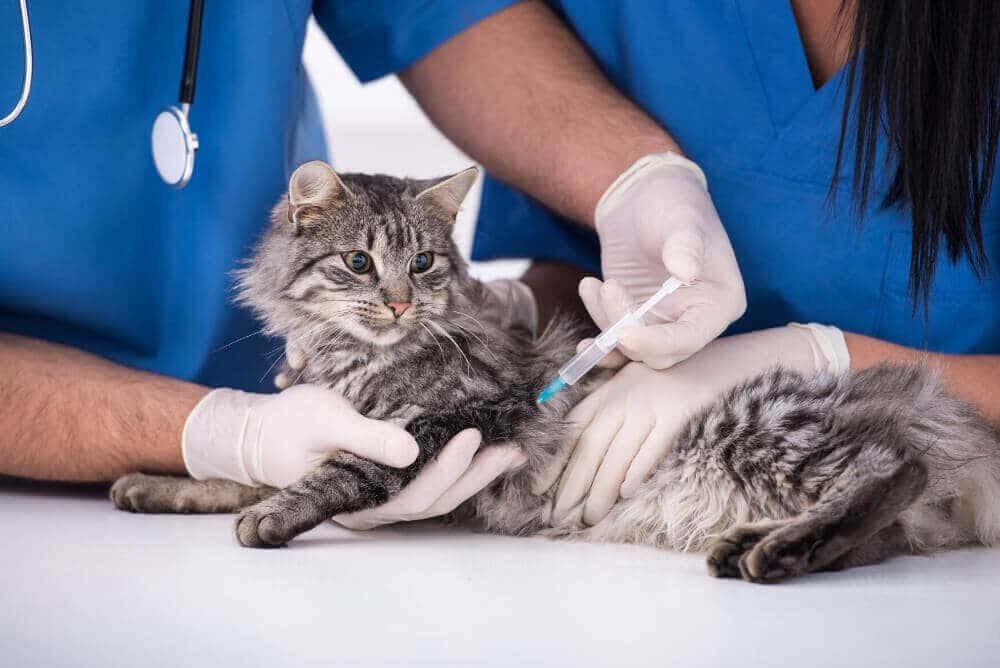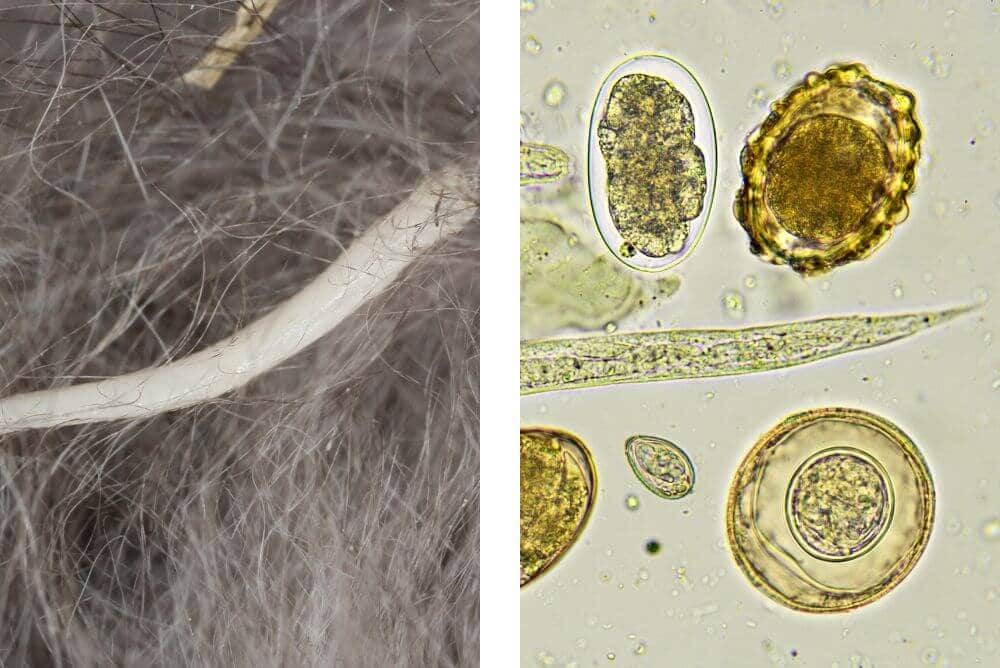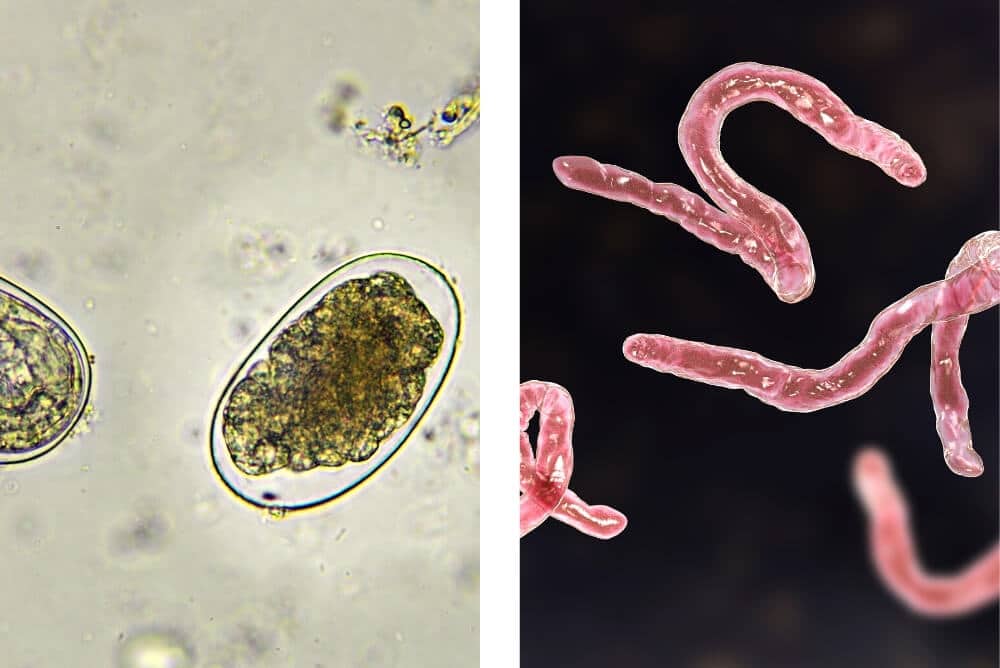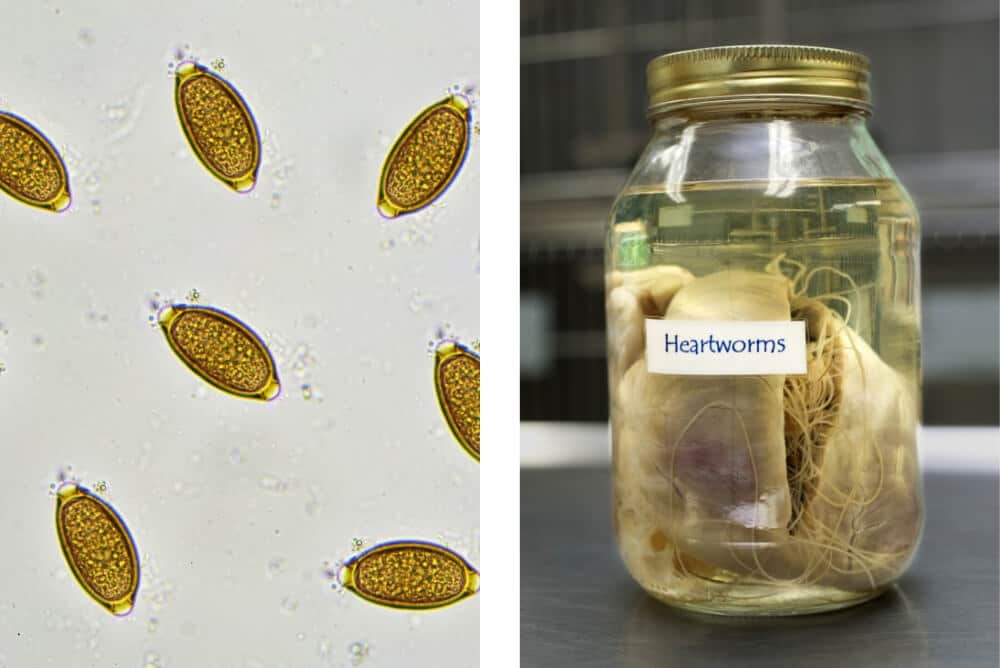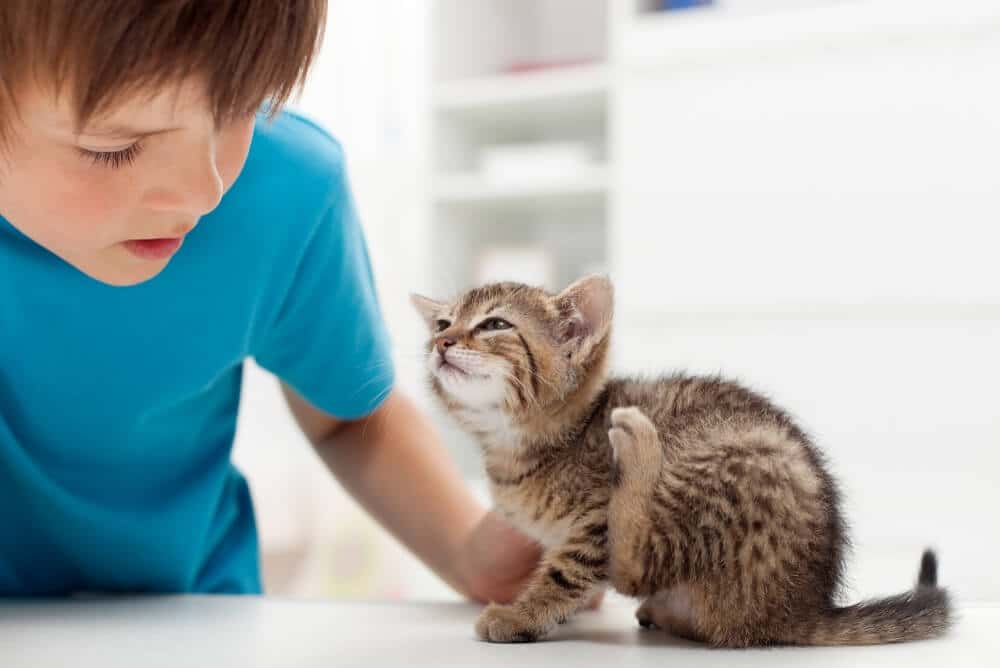The worm issue is a common concern for cat owners. There are several types of worms that affect cats. The issue not only causes some serious health risks for cats, but also they affect humans as well.
In most cases, you will not be able to tell whether your cat is affected by worms or not. Cats don’t show ill effects when worms infect them. But there are certain signs that tell you to give proper attention to your cat.
If you are concerned with how to deworm a cat, you are in the right place. In this article, I will discuss worms, why it affects, how to diagnose your cat, and how you can combat the disease and prevent it from occurring further.
Types of Worms
There are 6 types of worms. But only 3 types are responsible for infecting cats.
1. Roundworms
This is the most common type of intestinal parasite in cats. Roundworms grow about 3-5” long during adulthood. They look like wet spaghetti. Animal feces carry their eggs and pass to soil or other things. The parasites can live for months and even years in some cases.
Roundworms primarily affect cats in four ways:
- When cats lick anything that has eggs of these parasites, for example, soil
- If the cat consumes any rodent that has already eaten eggs
- If the mother’s milk contains worm larvae and kittens drink the milk; this is how the vast majority of kittens get affected by worms
- When a cat comes in contact with the feces of infected animals
2. Tapeworms
Tapeworms have long and flat segmented bodies up to 8-inches in length. The segments are found in feces and resemble rice grain. They can be found crawling around the cat’s anus or on the bed.
These parasites require a host as an intermedia to consume their eggs. Typically, these intermediate hosts are fleas and rodents. In most cases, cats eat the intermediate hosts and get affected by worms.
If a cat is diagnosed with fleas, the cat also needs to go through deworming treatment. Similarly, if your cat eats a host rodent, tapeworm treatment is a must for the cat.
3. Hookworms
These are the smallest parasites commonly found in cats. Hookworms usually take residence in the small intestine in cats. Their length is about an inch. As these parasites can feed on the blood, they can cause life-threatening anemia, mostly in kittens. However, cats of all ages have the risk as well.
Hookworms are usually passed in feces. They can infect both animals and humans, as well.
Other Types of Worms
Whipworms are about ¼-inch long and found in colon and cecum. They cause severe damage to these two organs in cats.
Heartworms reside in the heart and pulmonary arteries. Mosquitos are the host here. This parasite disease is treatable and preventable but can cause fatal damage if not treated in time.
The Symptoms of Worms in Cats
An infected cat might not look sick. But on the inside, the cat suffers very much. There are some symptoms usually found in infected cats.
· Worms in Stool
Actual worms are found in infected cat’s feces. They mostly look like rice grains and might move like little worms as well. Roundworms, hookworms, and tapeworms cause diarrhea in cats. Although there are other issues responsible for diarrhea, if your cat is going through a runny fecal thing, look for worms in the stool.
Other instances, such as blood from colon and intestinal irritation, can also occur. If you notice worms, you can collect and take them to the vet to confirm the matter.
· Vomiting
Cats vomit for several reasons. Roundworms cause vomiting in cats. If this is the case, you will find adult roundworms similar to spaghetti noodles when the cat throws up.
Heartworms also cause vomiting. Regardless of the reason, you should collect it into a small zipper bag and take it to the vet to examine. The vet will examine the throw-up and look for parasites and other signs.
· Weight Loss and Sudden Change in Appetite
Infected cats will experience weight loss. It happens because the worms inside the feline don’t allow nutrients to work at its full potential, which results in weight loss. However, depending on the size and quantity of the parasites, this change can be both drastic and marginal.
In some cases, cats develop an extended stomach. This distended abdomen is known as pot-belly. This happens when the cat is suffering from roundworms.
· Pale Gum and Lethargy
The gum of a healthy cat is pink. If parasites infect a cat, the gum changes to a pale color through sheer shock or anemia. You must visit a vet if you notice this change in your cat.
Additionally, if the cat has any lethargic or breathing difficulty, be sure to seek emergency assistance.
· Other Symptoms of Cat Worms
There are some other symptoms that infected cats show – chronic coughing, hair loss with skin irritation or inflammation, rubbing hindquarters across the ground, presence of segments of worms in skin, anus, fur, and hindquarters area.
Why Should You Deworm Your Cat?
Worms cause some severe damages in cats if it’s left untreated. Infected kittens suffer from growth delay. The immune system gets affected, and the feline cannot absorb all essential nutrients from diets.
Similarly, worms that reside in the intestines consume your cat’s essential nutrients as well as blood. Your cat gets more sick day by day, and at the same time, the worms become stronger and more impactful.
The most deworming medication kills or paralyzes worms in cats. So, if you regularly deworm your cat, it will ensure worms cannot reside in the cats. Some worms are very contagious to humans, as well. So, deworming your cat on a regular basis is a must to ensure a healthy and disease-free environment.
When Is It Time to Deworm Your Cat?
· Kittens
Pretty much all the kittens get affected by roundworms. Therefore, it’s necessary to deworm kittens during their early age.
You need to deworm your kittens when they are of 2, 4, 6, and 8 weeks; that means every two weeks until the kittens are eight weeks old. Furthermore, you need to repeat deworm again when they are 4 and 6 months of age.
· Adult Cats
Although adult cats are less affected by these parasites, still the risk is there. It’s highly recommended to deworm adult cats every 2 to 6 months using feline dewormer. This frequency depends on the lifestyle of cats and some other factors as well.
· Prolific Hunting Cats
Cats that spend more time outside while hunting, are at a much higher risk of this infection. Hunter cats regularly eat rodents that are one of the primary carrying hosts of worms. For such a high risk, the vet usually recommends deworming these cats every month.
· Pregnant and Nursing Cats
Once the mother cat gives birth to kittens, she needs to be dewormed during the first lactation period. You can deworm both the nursing cat and kittens at the same time. Before proceeding, make sure the worm medication you choose is recommended by the vet as it must be appropriate for nursing and lactating cats.
If the dewormer agent is able to eliminate roundworm and tapeworm at the same time, it would be the best. There is nothing wrong if you use topical dewormer for cats. Some dewormer effectively eliminates roundworm and tapeworm separately. You can adopt this option as well.
Specific dewormer might be required based on whether your cat regularly goes outside or not. Cats that always stay inside the house has much less risk of getting infected by worms. You can ask your vet for more expert advice on deworming.
Worm Treatment Options
There are two ways to treat worms in cats, chemical and all-natural. Your vet can prescribe the chemical treatment, or you can go to a drug shop and get it over the counter. Over-the-counter cat dewormers work as good as the prescribed ones.
If you prefer going with chemical treatment, here are the top effective chemicals to treat worms in cats –
- Pyrantel Pamoate works effectively by paralyzing both roundworms and hookworms.
- Praziquantel is specifically for treating tapeworms. The chemical starves until the parasites disintegrate.
- Piperazine paralyzes only roundworms. The worms then pass through the cat’s body. However, if you prefer going with all-natural treatment, Diatomaceous earth can be an effective option to dehydrate the worms. I’ll discuss natural treatment later in a different section.
Worm Medication for Cats
As far as the chemical treatment is a concern, you can give the treatment in various ways.
· Tablet
Tablets are given directly or by mixing into cats’ diets. There are tablets available in the drug store and pet store that effectively eliminates both roundworms and tapeworms.
· Spot-on
For your furball, who doesn’t like taking tablets, you can try spot-on treatments. It is suitable for kittens as well as pregnant and lactating cats.
· Paste or Granule
If you find a hard time with worm pills for cats, consider trying this option. Simply mix the worming treatment to your cat’s diet to feed it.
Natural Deworming Treatment
If you want your cat to get rid of worms naturally, this section is for you. This method is safe, inexpensive, and effective, as well.
· Method 1
Diatomaceous earth is the best natural dewormer for cats. It’s the fossilized remains of microscopic shells with very sharp edges that cut into the bodies of parasites such as worms and eventually kills them.
To treat your cat with it, mix two teaspoons of it with cat’s wet food twice a day for at least 30 days to effectively eliminate worms and parasites.
· Method 2
You can also treat your cat with wormwood herbal wormer. This natural herb works very effectively against parasites and worms.
· Method 3
Another effective way to naturally treat worm is by raw pumpkin seed. Pumpkin seeds have anti-parasite properties and essential nutrients for cats.
Finely grind the seeds using a blender or food grinder and one teaspoon with the feline wet food. Feed your cat like this daily until you see positive results.
· Method 4
Eliminate the worms of your cat in a playful way. Dust the feline in food-grade Diatomaceous earth to kill fleas that work as a host for worms in cats. Try doing it once a week for better results. Diatomaceous doesn’t only kill internal parasites; it’s also effective when it comes to killing external parasites such as fleas.
If you can free your cat of fleas, 90% of the work will be done. Do it outside the house, and be sure to use a dust mask while treating the cat so that you don’t inhale the fine dust particles.
How Are Worms Eliminated?
Parasites such as worms are treatable. If a cat is diagnosed properly, the vet will prescribe medication to treat worms. Based on the parasite and infestation, each medication will work differently –
· Roundworm
Roundworm medication for cats makes the worms to detach from the intestinal tract. Then, it excretes them with the stool.
· Tapeworm
Tapeworm medication for cats breaks down the tapeworms that reside inside the intestinal tract. You might not even notice them in feces as they turn smaller.
· Hookworms
It’s recommended to apply medication that only kills hookworms. Further treatment is required after 2-4 weeks, followed by the first treatment. The baby hookworms become adults after a few weeks, and the following treatment is to eliminate these worms.
· Heartworms
Heartworms are generally treated with injectable medication, special diets, diuretics, and antibiotics to reduce fluid accumulation. In extreme cases, the vet may prescribe heart medication, as well.
Be Careful about the Medication
When you are about to purchase deworming medication for your cat, you need to keep your furball’s health and safety in mind. Be sure to check the potential side effects of medications. If your cat is already suffering from sickness, it’s highly recommended to consult with your veterinarian before proceeding further.
The vet must diagnose pregnant and nursing cats before feeding them any medication. When it comes to feeding medicine to cats, it’s always best to get the ones that can be mixed or given in their diets.
However, if you prefer worm pills for cats, a pill-gun will make it less hassle for you. Be sure to follow up with the treatment to make the worms gone for good.
How to Prevent Worms?
In many cases, cats have this worm infestation in them without showing any symptoms. You cannot tell what’s the actual matter without visiting the vet. But, you don’t want to face the worm issue in your cat whatsoever. So, here are some useful suggestions to prevent worms from getting in your cat in the first place –
· Keep Your Cat Indoors
Rodents, rabbits, and birds are the carrier host of worms. If your cat spends a lot of time outdoors, it’s more likely that the feline will hunt them and consume later on.
Even if it’s not possible for you to keep your cat inside the house all the time, be sure to keep an eye on whether the cat is hunting any rodents or not. However, when it comes to your kittens, you must ensure that they don’t go outside until they are adults.
· Examine the Feces
If your cat randomly roams outside, make sure you take the stool sample to the vet to examine for parasites. In some cases, it’s the only way to catch the disease when the cat doesn’t show any signs.
· Flea Prevention
Cats that are infected with fleas for a long time, there is a high chance they might get affected by tapeworms. Therefore, you need to prevent fleas at first. Use preventative flea treatment on a regular basis, once a month. This way, you will protect your feline from both fleas and tapeworms as well.
· Clean-Living Space
To prevent worms in the first place, you must ensure a clean-living space for your cats. You need to clean the litter box regularly, always keep the water fresh and clean, and wash the bowls daily.
· Keep the Feline Healthy
A cat with proper diets and overall health prevents parasites. Feed your cat nutrient-enriched foods that can keep the body healthy and fit. Be sure to take these precautions as well –
- Give initial treatment to all kittens at the age of 3 weeks.
- Depending on your cat’s lifestyle, habit, and geographical location, perform fecal examination 2-3 times per year.
- Clean up feces in the backyard 2-3 times per week, at least.
- Immediately dispose of cat’s feces using sanitary gloves and bags in public parks and playgrounds.
Worms and Human Health
Roundworms in cats can be very dangerous for human beings also. If a person comes in contact with infected cat feces or soil, it can result in infection as well as ingestion.
Hosts of worms such as cats, rats, raccoons, rabbits use dirt and sand-covered outdoor surfaces as their litter box. Around 10,000 children each year get infected with parasitic worms. Some extreme cases even caused blindness.
So, sandpits, where children play, must be covered when not in use so that host animals cannot defect them. Don’t allow the children to play where cats pass their feces.
It’s also recommended that gardeners wear hand gloves to avoid contamination and clean out litter boxes every day.
Worms and Fleas
Fleas are one of the most common concerns of cat owners. If the fleas carry worms with them, they will bring more trouble for your cat. Once the cat accidentally swallows a flea, there is a high chance of growing tapeworms.
So, even if you take all necessary steps to prevent worms, if you are headless regarding fleas, your prevention will not be much effective. Regularly treat your cat to prevent fleas as well.
If you have a dog in the house, make sure the dog is safe from fleas too. Otherwise, the dog will be the reason for infecting your cat and vice-versa.
This video will help to get more information – Deworming My Foster Kittens!
Final Words
To keep your cat healthy and happy, you must know how to deworm a cat, as it requires you to deworm the cat 2-3 times a year even if the cat is not infected.
Look for symptoms of worms in your cat, and make sure the litter box, outdoor sand-covered surfaces are also taken care of to prevent worms from infecting people living in your house or nearby.

